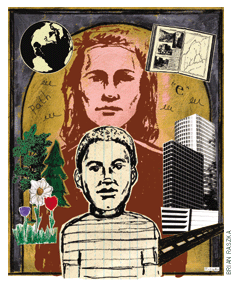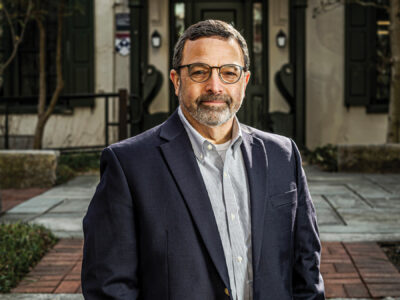
Teaching and learning in West Philadelphia.
By Sarah Blackman
William thinks that all the ground in the world is made of cement and blacktop, interrupted by a few weeds in the sidewalk cracks and scattered with some bits of glass you have to look out for. A metal fence wraps around his school’s playground, sectioning it off from a parking lot. I was once a second grader, like William is now, and the playground of my rural school was bordered by the edge of a forest.
When I was in second grade, I read The Secret Garden; now that William is in second grade, he needs help with The Cat in the Hat, which is why we know each other. In the tiny library of his school, a 15-minute walk from Penn, we sound words out together and learn lots of vocabulary, though William knows many words that barely existed in the world I grew up in: “My mom took Greyhound to see my sister,” he says. His class goes on field trips to farms outside the city; my second-grade class went to Harrisburg, to us the biggest city in the world.
Whenever I see William, I imagine him at my old elementary school, awed by the space and the trees, playing on all the fun equipment in our cluster of slides and monkey bars. I like to imagine showing him how the bark peels on a birch tree, and asking him if he remembers path, a word he didn’t know in a story we once read. I’d love to watch him follow a path in the woods: “You see? Much different from a sidewalk,” I’d say. And then I remember that my fantasies are bigoted, that no one asked for me to assume he is missing out on anything. All they asked me to do was teach him to read.
William and I both think that our second-grade teachers are the nicest ladies in the world. Mine kept pet mice in a fish tank and let the class name them; William’s teacher steps on the mice and roaches that creep into their classroom, saving the day and calming the squeals.
William is much more conscious in company than I was at seven. He often asks me how my weekend was before I have a chance to ask him first, startling me with his maturity. He has brothers, sisters, and cousins of all ages in West Philadelphia, and hence an unexpectedly sharp ability to estimate the mentality of a 19-year old. He implicitly knows that I no longer play with toys yet am too young to have children his age. I, on the other hand, spoke in a sing-song voice when first introduced, and said, “Sarah wants you to pick out some books.” I had expected a baby, but William is no baby. Having no younger brothers and sisters myself, I have stopped trying to figure out what a seven-year old is and have defaulted to speaking as I would to a friend, which, I must say, is working quite well.
I know that William is excited because his mother is getting married, though he says he fell asleep in his church while she was making arrangements; however, William doesn’t know that when I was in second grade, my mother stood in the kitchen and cried over the telephone because she was getting divorced. I hadn’t been to church since I was too small to remember. Second grade was my last year in the school next to the pine trees because after that we had a new house, where I would read in the bedroom I shared with my mother.
I am always very happy when I arrive at William’s school, when the guard signs me in, when I poke my head into his classroom and ask his teacher if he can come read with me. I am the one bubbling with childish elation when we head downstairs to the library together. William shows his attachment to me in quieter ways: I once said to him, “I hope talking about vowels today didn’t bore you too much.” And he laughed at me, shaking his head at my insecurity and saying, “Never, Sarah.” Sometimes William is not as simple as I am.
William and I are nearly 12 years apart. He interrupts my explanation of the Silent e Rule to tell me how much he hopes to go to Chuck E. Cheese on his birthday. I recently bought a book to give him, which is now on my desk, awaiting the inscription I hesitate to write. It makes me nervous to think that, when he is my age, what I write in the inside cover of his book might be a large part of his memory of me. Should I tell him that learning to read is a great accomplishment? Should I wish him “good luck,” or is there something more substantial to be said? There is a lot of pressure in knowing that parts of you will be caught in the web of someone’s childhood memory, preserved within the mix of ancient voices and images. And maybe someday, when William is older, he too will wonder whether I remember him.
William, who is about to turn eight, says his real dad is the boss of a fast-food store. When I turned eight, my mother became a cook in a school cafeteria. She always wanted me to go to college, and I hope William’s parents have the same idea in mind for him. Since I have had a chance to find out that the world is not all the same as the countryside, I want William also to have a chance to explore a little, to be able to move wherever he wants, even though he’ll always compare the country to home in the city. I feel good knowing that his learning to read will have something to do with his enjoyment of his life, and I hope he knows that teaching him has had a lot to do with my enjoyment of mine.
Sarah Blackman is a sophomore English major from Williamsport, Pennsylvania.




